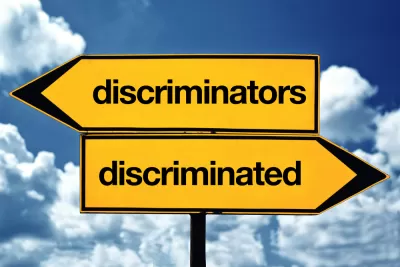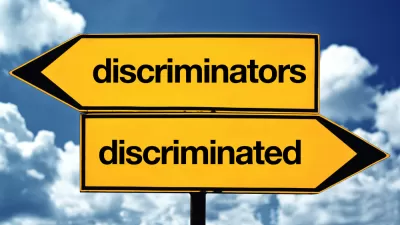Drawing on a distinction between equality and equity, Rick Jacobus argues that so-called 'poor doors' are a necessary compromise to promote affordable housing and neighborhood integration.

Having chosen to include affordable units in new project, some developers infamously provide separate entrances for the subsidized residents. "New York had been allowing this practice for years and the Times had even criticized it previously, but the phrase 'poor door’ captured the public imagination and reminded many of segregation in the Jim Crow South."
While the practice makes us squeamish, poor doors are often a misleading label. From the article: "They built a six-story [affordable] rental building immediately next to their 43-story luxury tower. What is odd about this project is not that it has two doors, but that it is considered one building at all."
More fundamentally, poor doors might be the price we pay to integrate neighborhoods. "The benefits of integration come from locating in opportunity-rich, healthier, and safer neighborhoods and not from direct social interaction with higher-income neighbors."
Jacobus points to the irony of fighting poor doors when the other option is to segregate the poor in vast under-served neighborhoods, out of sight and out of mind. "Real and meaningful economic integration will necessarily be uncomfortable. Some people will have more of everything and when we live together that difference will be awkward. To me, the 'poor door' controversy is all about avoiding that awkwardness."
FULL STORY: In Defense of the ‘Poor Door’

Maui's Vacation Rental Debate Turns Ugly
Verbal attacks, misinformation campaigns and fistfights plague a high-stakes debate to convert thousands of vacation rentals into long-term housing.

Planetizen Federal Action Tracker
A weekly monitor of how Trump’s orders and actions are impacting planners and planning in America.

In Urban Planning, AI Prompting Could be the New Design Thinking
Creativity has long been key to great urban design. What if we see AI as our new creative partner?

King County Supportive Housing Program Offers Hope for Unhoused Residents
The county is taking a ‘Housing First’ approach that prioritizes getting people into housing, then offering wraparound supportive services.

Researchers Use AI to Get Clearer Picture of US Housing
Analysts are using artificial intelligence to supercharge their research by allowing them to comb through data faster. Though these AI tools can be error prone, they save time and housing researchers are optimistic about the future.

Making Shared Micromobility More Inclusive
Cities and shared mobility system operators can do more to include people with disabilities in planning and operations, per a new report.
Urban Design for Planners 1: Software Tools
This six-course series explores essential urban design concepts using open source software and equips planners with the tools they need to participate fully in the urban design process.
Planning for Universal Design
Learn the tools for implementing Universal Design in planning regulations.
planning NEXT
Appalachian Highlands Housing Partners
Mpact (founded as Rail~Volution)
City of Camden Redevelopment Agency
City of Astoria
City of Portland
City of Laramie



























